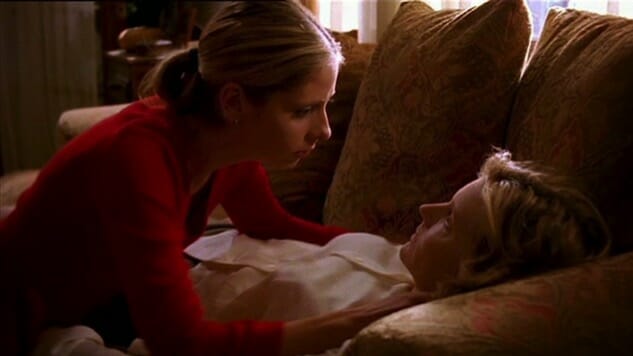Revisiting Buffy the Vampire Slayer‘s “The Body,” for Mother’s Day, 2016

“There’s way more important stuff going on right now. There’s a lot of crucial… you know… stuff.” So says Dawn (Michelle Trachtenberg) in Buffy the Vampire Slayer’s fifth-season episode “The Body.” At that moment, she is talking to a cute boy in her art class about a female peer they both consider superficial and stuck-up. However, little does Dawn know that her big sister, Buffy (Sarah Michelle Gellar), is about to break tragic news—the death of their mother, Joyce (Kristine Sutherland)—to her, which will embody that truth in a profoundly devastating way.
There are few things more crushing than the death of a mother—the woman who gave birth to you, who brought you into this world, who (hopefully) raised you to be the person you are. Even if you weren’t on the best of terms with your mother, there’s sure to still be something fundamentally stinging about her passing. Mother’s Day may be an annual celebration of motherhood, but being as imperfect as we human beings are, especially when it comes to taking things for granted, the sad truth is, we may not always be able to truly appreciate our mothers until they’re gone forever.
For Buffy Summers, the “Chosen One” who, as a vampire slayer, frequently carried the weight of the world on her shoulders, her mother Joyce offered a much-needed bedrock of normalcy. That’s not to say they didn’t have their disagreements, as all parents and their offspring inevitably do. After all, throughout the first two seasons, Joyce was oblivious to her daughter’s double life, until tensions became so high that, at the end of Season Two, Buffy was forced to reveal everything to her. Even after these revelations—and Buffy’s disappearance from Sunnydale, after being forced to stake her beloved Angel (David Boreanaz) to death—Joyce eventually came to accept her daughter’s dangerous side job. At one point, in the Season Three episode “Gingerbread,” she even went so far as to try and tag along with her daughter in order to get a sense of the slayer life. Not all sons and daughters are so lucky to have parents who will accept them for who they are, however difficult that adjustment process may be. Through the relationship between Buffy and her mother, Buffy creator Joss Whedon offered a realistic encapsulation of familial dynamics amid the supernatural intrigue.
-

-

-

-

-

-

-

-

-

-

-

-

-

-

-

-

-

-

-

-

-

-

-

-

-

-

-

-

-

-

-

-

-

-

-

-

-

-

-

-








































